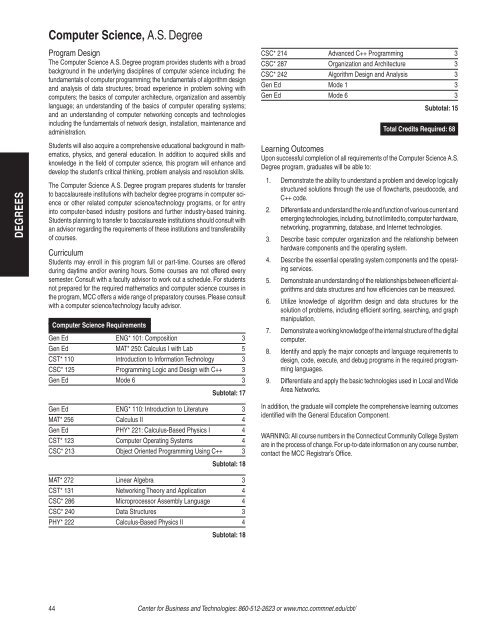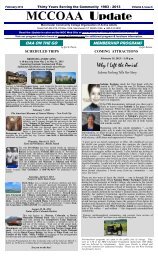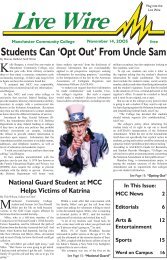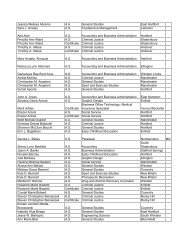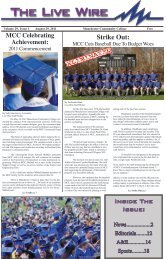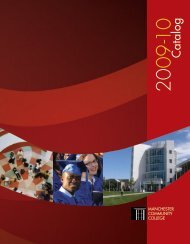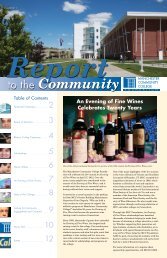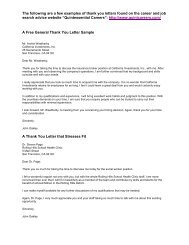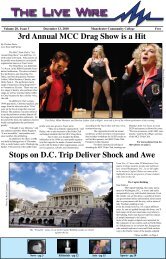Liberal Arts and Science - Manchester Community College ...
Liberal Arts and Science - Manchester Community College ...
Liberal Arts and Science - Manchester Community College ...
Create successful ePaper yourself
Turn your PDF publications into a flip-book with our unique Google optimized e-Paper software.
DEGREES<br />
Computer <strong>Science</strong>, A.S. Degree<br />
Program Design<br />
The Computer <strong>Science</strong> A.S. Degree program provides students with a broad<br />
background in the underlying disciplines of computer science including: the<br />
fundamentals of computer programming; the fundamentals of algorithm design<br />
<strong>and</strong> analysis of data structures; broad experience in problem solving with<br />
computers; the basics of computer architecture, organization <strong>and</strong> assembly<br />
language; an underst<strong>and</strong>ing of the basics of computer operating systems;<br />
<strong>and</strong> an underst<strong>and</strong>ing of computer networking concepts <strong>and</strong> technologies<br />
including the fundamentals of network design, installation, maintenance <strong>and</strong><br />
administration.<br />
Students will also acquire a comprehensive educational background in mathematics,<br />
physics, <strong>and</strong> general education. In addition to acquired skills <strong>and</strong><br />
knowledge in the field of computer science, this program will enhance <strong>and</strong><br />
develop the student’s critical thinking, problem analysis <strong>and</strong> resolution skills.<br />
The Computer <strong>Science</strong> A.S. Degree program prepares students for transfer<br />
to baccalaureate institutions with bachelor degree programs in computer science<br />
or other related computer science/technology programs, or for entry<br />
into computer-based industry positions <strong>and</strong> further industry-based training.<br />
Students planning to transfer to baccalaureate institutions should consult with<br />
an advisor regarding the requirements of these institutions <strong>and</strong> transferability<br />
of courses.<br />
Curriculum<br />
Students may enroll in this program full or part-time. Courses are offered<br />
during daytime <strong>and</strong>/or evening hours. Some courses are not offered every<br />
semester. Consult with a faculty advisor to work out a schedule. For students<br />
not prepared for the required mathematics <strong>and</strong> computer science courses in<br />
the program, MCC offers a wide range of preparatory courses. Please consult<br />
with a computer science/technology faculty advisor.<br />
44<br />
Computer <strong>Science</strong> Requirements<br />
Gen Ed ENG* 101: Composition 3<br />
Gen Ed MAT* 250: Calculus I with Lab 5<br />
CST* 110 Introduction to Information Technology 3<br />
CSC* 125 Programming Logic <strong>and</strong> Design with C++ 3<br />
Gen Ed Mode 6 3<br />
Subtotal: 17<br />
Gen Ed ENG* 110: Introduction to Literature 3<br />
MAT* 256 Calculus II 4<br />
Gen Ed PHY* 221: Calculus-Based Physics I 4<br />
CST* 123 Computer Operating Systems 4<br />
CSC* 213 Object Oriented Programming Using C++ 3<br />
Subtotal: 18<br />
MAT* 272 Linear Algebra 3<br />
CST* 131 Networking Theory <strong>and</strong> Application 4<br />
CSC* 286 Microprocessor Assembly Language 4<br />
CSC* 240 Data Structures 3<br />
PHY* 222 Calculus-Based Physics II 4<br />
Subtotal: 18<br />
Center for Business <strong>and</strong> Technologies: 860-512-2623 or www.mcc.commnet.edu/cbt/<br />
CSC* 214 Advanced C++ Programming 3<br />
CSC* 287 Organization <strong>and</strong> Architecture 3<br />
CSC* 242 Algorithm Design <strong>and</strong> Analysis 3<br />
Gen Ed Mode 1 3<br />
Gen Ed Mode 6 3<br />
Subtotal: 15<br />
Total Credits Required: 68<br />
Learning Outcomes<br />
Upon successful completion of all requirements of the Computer <strong>Science</strong> A.S.<br />
Degree program, graduates will be able to:<br />
1. Demonstrate the ability to underst<strong>and</strong> a problem <strong>and</strong> develop logically<br />
structured solutions through the use of flowcharts, pseudocode, <strong>and</strong><br />
C++ code.<br />
2. Differentiate <strong>and</strong> underst<strong>and</strong> the role <strong>and</strong> function of various current <strong>and</strong><br />
emerging technologies, including, but not limited to, computer hardware,<br />
networking, programming, database, <strong>and</strong> Internet technologies.<br />
3. Describe basic computer organization <strong>and</strong> the relationship between<br />
hardware components <strong>and</strong> the operating system.<br />
4. Describe the essential operating system components <strong>and</strong> the operating<br />
services.<br />
5. Demonstrate an underst<strong>and</strong>ing of the relationships between efficient algorithms<br />
<strong>and</strong> data structures <strong>and</strong> how efficiencies can be measured.<br />
6. Utilize knowledge of algorithm design <strong>and</strong> data structures for the<br />
solution of problems, including efficient sorting, searching, <strong>and</strong> graph<br />
manipulation.<br />
7. Demonstrate a working knowledge of the internal structure of the digital<br />
computer.<br />
8. Identify <strong>and</strong> apply the major concepts <strong>and</strong> language requirements to<br />
design, code, execute, <strong>and</strong> debug programs in the required programming<br />
languages.<br />
9. Differentiate <strong>and</strong> apply the basic technologies used in Local <strong>and</strong> Wide<br />
Area Networks.<br />
In addition, the graduate will complete the comprehensive learning outcomes<br />
identified with the General Education Component.<br />
WARNING: All course numbers in the Connecticut <strong>Community</strong> <strong>College</strong> System<br />
are in the process of change. For up-to-date information on any course number,<br />
contact the MCC Registrar’s Office.


